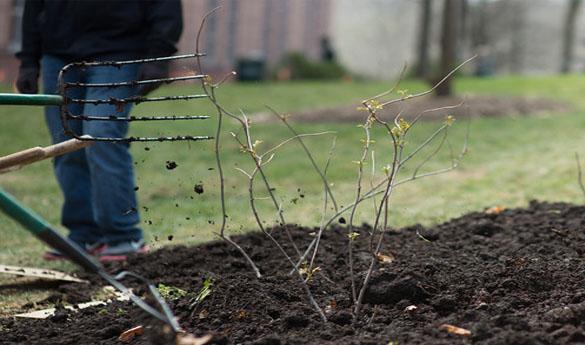Innovation Food Forest promotes sustainable gardening
On the way to the Engineering and Arts & Design buildings from the Johnson Center, students and faculty can now pick up fresh fruit - straight from the source.
“Feel free to pick fruit, but I want to get these plants healthy and established before we start picking some vegetation,” said Elizabeth Torrens, project manager and volunteer for the Innovation Food Forest (IFF).
In the IFF, Mason students and faculty use sustainable practices to yield fruits and vegetables.
The group uses a method called permaculture, which was taught in a permaculture design certification course offered by the Mason Sustainability Institute.
Permaculture emphasizes sustainable and environmentally responsible agriculture techniques.
“If there’s any fruit, people are welcome to take them but it would be good to look up what’s ripe because if they pick a plant that’s not ripe it’s not going to do anybody any good,” Torrens said.
Torrens completed the permaculture course in spring 2012 and was inspired to use her new knowledge and skills on campus.
“[Torrens] was so excited about it that she decided to put in a proposal to create a food forest on Mason’s campus using the principles of permaculture,” said Lenna Storm, special project manager for the Office of Sustainability and staff co-chair of the Patriot Green Fund.
Torrens said that the garden allows the campus to practice sustainability not only as a classroom lesson but also as hands-on experience.
“A lot of students aren’t involved in their food, that’s just our society now,” Torrens said. “I want people to start to recognize how much effort and value comes from the produce. One hundred years ago, they knew where their berries were coming from and that you can only get them a certain time a year but now we ship stuff across the world.”
According to Storm, food is a simple way to spark a natural interest in sustainability.
“Food is one of those things that pretty much everybody gets,” Storm said. “When you say to somebody, you need to recycle because it’s the right thing to do, everybody understands recycling. For the most part, they understand why. It’s the same thing with food. When you give somebody an opportunity to have a fresh piece of fruit right from the garden, they understand the difference between that tomato and some sickly-looking thing they get at the supermarket.”
Torrens hopes that people who help with the garden at Mason will be able to take what they learn and implement those skills in developing their own sustainable food system.
“If you come out here and help and volunteer, you participate and just observe, then you start to feel more comfortable about it and you might take that home and do it.”
Volunteers have come from many areas of the Mason community, including classes where students are required to have volunteer hours.
Some volunteers are from departments that are less associated with a sustainability.
Lara Harmon, who works at the Center for History and New Media, heard about the garden and decided to volunteer her time and gain new skills.
Opportunities to get involved range from hands-on dirty jobs like watering and planting to management roles.
Torrens in creating a form that prospective volunteers can fill out to see what area of the food forest they would like to help with.
Another opportunity to volunteer will be during the Day of Service on Sept. 11. Volunteers will be creating a database for the plants in the garden.
This database will then be used to create signage for each plant in the garden.
“You’ll get to learn something while doing it. It’s fun to look up plant’s information and read all kinds of random facts about all kinds of stuff,” Torrens said.

